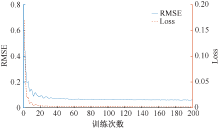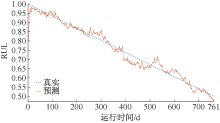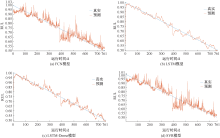| [1] |
LIANG Xiaobin, LIANG Wei, ZHANG Laibin, et al. Risk assessment for long-distance gas pipelines in coal mine gobs based on structure entropy weight method and multi-step backward cloud transformation algorithm based on sampling with replacement[J]. Journal of Cleaner Production, 2019, 227:218-228.
doi: 10.1016/j.jclepro.2019.04.133
|
| [2] |
武琳玉, 梁伟, 沙夺林. 油气站场典型设备的焊缝缺陷检测与识别方法[J]. 中国安全科学学报, 2020, 30(11):108-113.
doi: 10.16265/j.cnki.issn 1003-3033.2020.11.016
|
|
WU Linyu, LIANG Wei, SHA Duolin. Weld defect detection and identification method of typical equipment in oil-gas station[J]. China Safety Science Journal, 2020, 30(11):108-113.
doi: 10.16265/j.cnki.issn 1003-3033.2020.11.016
|
| [3] |
车畅畅, 王华伟, 倪晓梅, 等. 基于1D-CNN和Bi-LSTM的航空发动机剩余寿命预测[J]. 机械工程学报, 2021, 57(14):304-312.
doi: 10.3901/JME.2021.14.304
|
|
CHE Changchang, WANG Huawei, NI Xiaomei, et al. Residual life prediction of aeroengine based on 1D-CNN and Bi-LSTM[J]. Journal of Mechanical Engineering, 2021, 57(14):304-312.
doi: 10.3901/JME.2021.14.304
|
| [4] |
裴洪, 胡昌华, 司小胜, 等. 基于机器学习的设备剩余寿命预测方法综述[J]. 机械工程学报, 2019, 55(8):1-13.
doi: 10.3901/JME.2019.08.001
|
|
PEI Hong, HU Changhua, SI Xiaosheng, et al. Review of machine learning based remaining useful life prediction methods for equipment[J]. Journal of Mechanical Engineering, 2019, 55(8):1-13.
doi: 10.3901/JME.2019.08.001
|
| [5] |
张其霄, 董鹏, 王科文, 等. 基于贝叶斯优化LSTM的发动机剩余寿命预测[J]. 火力与指挥控制, 2022, 47(4):85-89.
|
|
ZHANG Qixiao, DONG Peng, WANG Kewen, et al. Residual service life prediction for aircraft engines based on Bayesian optimal long short-term memory network[J]. Fire Control & Command Control, 2022, 47(4):85-89.
|
| [6] |
李亚平, 李素杰, 马波, 等. 基于TCN的滚动轴承振动趋势与剩余寿命预测研究[J]. 现代制造工程, 2021, 21(9):124-131.
|
|
LI Yaping, LI Sujie, MA Bo, et al. Research on vibration trend and remaining life prediction of rolling bearings based on TCN[J]. Modern Manufacturing Engineering, 2021, 21(9):124-131.
|
| [7] |
党英, 吉卫喜, 陆家辉, 等. 基于深度学习的铣刀剩余寿命预测方法研究[J]. 现代制造工程, 2021(12):79-87.
|
|
DANG Ying, JI Weixi, LU Jiahui, et al. Research on prediction method of remaining useful life of milling cutter based on deep learning[J]. Modern Manufacturing Engineering, 2021(12):79-87.
|
| [8] |
张新生, 王旭业, 张莹莹, 等. 海底腐蚀管道剩余寿命预测与维修策略研究[J]. 中国安全科学学报, 2022, 32(3):41-47.
doi: 10.16265/j.cnki.issn1003-3033.2022.03.006
|
|
ZHANG Xinsheng, WANG Xuye, ZHANG Yingying, et al. Research on remaining life prediction and maintenance strategy of corroded submarine pipelines[J]. China Safety Science Journal, 2022, 32(3):41-47.
doi: 10.16265/j.cnki.issn1003-3033.2022.03.006
|
| [9] |
俞树荣, 李建华, 李淑欣, 等. 埋地管道腐蚀剩余寿命预测概率模型[J]. 中国安全科学学报, 2008, 18(6):11-15.
|
|
YU Shurong, LI Jianhua, LI Shuxin, et al. Probability model for the prediction of corrosion remaining life of underground pipelines[J]. China Safety Science Journal, 2008, 18 (6):11-15.
|
| [10] |
YU Wennian, KIM I Y, MECHEFSKE C. Remaining useful life estimation using a bidirectional recurrent neural network based autoencoder scheme[J]. Mechanical Systems Signal Processing, 2019, 129:764-780.
doi: 10.1016/j.ymssp.2019.05.005
|
| [11] |
WANG Biao, LEI Yaguo, LI Naipeng, et al. Deep separable convolutional network for remaining useful life prediction of machinery[J]. Mechanical Systems Signal Processing, 2019, 134:1-18.
|
| [12] |
XU Zhaoyi, GUO Yanjie, SALEH J H. Accurate remaining useful Life prediction with uncertainty quantification: a deep learning and nonstationary Gaussian process approach[J]. IEEE Transactions on Reliability, 2022, 71(1):443-456.
doi: 10.1109/TR.2021.3124944
|
| [13] |
苏春, 李乐. 基于隐半马尔科夫退化模型的非等周期预防性维修优化[J]. 东南大学学报:自然科学版, 2021, 51(2):342-349.
|
|
SU Chun, LI Le. Optimization of non-equal periodic preventive maintenance based on hidden semi-Markov degradation model[J]. Journal of Southeast University: Natural Science Edition, 2021, 51(2):342-349.
|
| [14] |
REN Lei, SUN Yaqiang, CUI Jin, et al. Bearing remaining useful life prediction based on deep autoencoder and deep neural networks[J]. Journal of Manufacturing Systems, 2018, 48:71-77.
doi: 10.1016/j.jmsy.2018.04.008
|
| [15] |
韩松, 徐林森. 基于主成分分析和支持向量机分类模型的滚动轴承故障诊断[J]. 科学技术与工程, 2021, 21(8):3153-3158.
|
|
HAN Song, XU Linsen. Fault diagnosis of rolling bearing based on classification model of principal component analysis and support vector machine[J]. Science Technology and Engineering, 2021, 21(8):3153-3158.
|
| [16] |
YAO Junming, LIANG Wei, XIONG Jingyi. Novel intelligent diagnosis method of oil and gas pipeline defects with transfer deep learning and feature fusion[J]. International Journal of Pressure Vessels and Piping, 2022, 200:1-17.
|
| [17] |
李宁, 徐彬森, 武宏亮, 等. 人工智能在测井地层评价中的应用现状及前景[J]. 石油学报, 2021, 42(4):508-522.
doi: 10.7623/syxb202104008
|
|
LI Ning, XU Binsen, WU Hongliang, et al. Application status and prospects of artificial intelligence in well logging and formation evaluation[J]. Acta Petrolei Sinica, 2021, 42(4):508-522.
doi: 10.7623/syxb202104008
|
| [18] |
WU Jianda, LUO Wenjun, YAO Kaichao. Acoustic signal classification using symmetrized dot pattern and convolutional neural network[J]. Machines, 2022, 10(2):1-15.
doi: 10.3390/machines10010001
|
| [19] |
朱馨, 李建微, 郭伟, 等. 基于机器学习的森林火险预测模型[J]. 中国安全科学学报, 2022, 32(9):152-157.
doi: 10.16265/j.cnki.issn1003-3033.2022.09.2729
|
|
ZHU Xin, LI Jianwei, GUO Wei, et al. Forest fire risk prediction model based on machine learning[J]. China Safety Science Journal, 2022, 32(9):152-157.
doi: 10.16265/j.cnki.issn1003-3033.2022.09.2729
|
| [20] |
温海茹, 陈雯柏. 一种基于DCNN-LSTM混合模型的RUL预测方法[J]. 兵器装备工程学报, 2020, 41(12):87-92.
|
|
WEN Hairu, CHEN Wenbo. RUL prediction method based on DCNN-LSTM hybrid model[J]. Journal of Ordnance Equipment Engineering, 2020, 41(12):87-92.
|
| [21] |
XIA Jun, FENG Yunwen, LU Cheng, et al. LSTM-based multi-layer self-attention method for remaining useful life estimation of mechanical systems[J]. Engineering Failure Analysis, 2021, 125:1-13.
|
| [22] |
YANG Jie, MA Chunhui, CHENG Lin, et al. Mesoscopic parameter calibration model of discrete elements in rockfill material based on QGA-SVM[J]. Advances in Science and Technology of Water Resources, 2018, 38(5):53-58.
|
| [23] |
邱道宏, 李术才, 张乐文, 等. 基于模型可靠性检查的QGA-SVM岩爆倾向性分类研究[J]. 应用基础与工程科学学报, 2015, 23(5):981-991.
|
|
QIU Daohong, LI Shucai, ZHANG Lewen, et al. Classification of rockburst tendency based on QGA-SVM model reliability check[J]. Journal of Basic Science and Engineering, 2015, 23(5):981-991.
|
| [24] |
戴尉阳, 唐忠, 史晨豪, 等. 基于QGA-QBP的动力电池SOC估计[J]. 电源技术, 2021, 45(7):893-896.
|
|
DAI Weiyang, TANG Zhong, SHI Chenhao, et al. SOC estimation of power battery based on QGA-QBP[J]. Chinese Journal of Power Sources, 2021, 45(7):893-896.
|
| [25] |
苏中滨, 陆艺伟, 谷俊涛, 等. 改进的QGA-ELM算法水稻叶面积指数反演模型[J]. 光谱学与光谱分析, 2021, 41(4):1227-1233.
|
|
SU Zhongbin, LU Yiwei, GU Juntao, et al. Improved QGA-ELM algorithm for rice leaf area index inversion model[J]. Spectroscopy and Spectral Analysis, 2021, 41(4):1227-1233.
|































